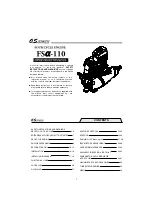
7
Safety information
Safety regulations during engine operation
Filling fuel
There is a risk of fire and explosion when filling fuel.
Smoking is prohibited and the engine must be turned
off. Never overfill the tank. Close the filler cap
securely. Use only fuel recommended in the operators
manual. The incorrect grade of fuel can disturb opera-
tion or cause breakdown. This can also lead to the
control rod jamming on diesel engines, which will cau-
se the engine to overspeed and risk damaging machi-
nery and causing personal injury.
Combustible enviroment
Due to the risk of fire and/or explosion, do not start or
continue to run the engine if there is a suspected leak
or discharge of combustible media, e.g. fuel oil or
LPG, in the engine surroundings.
Carbon monoxide poisoning
When a vessel is moving forward, it will cause a cer-
tain vacuum to form behind the vessel. In unfortunate
circumstances, the suction from this vacuum can be
so great that the exhaust gases from the vessel are
drawn into the bridge or cabin and cause carbon mon-
oxide poisoning. This problem is most prevalent on
high, wide vessels with abrupt stern. Other factors
that can increase the effect of the suction are wind
conditions, load distribution, swells, trim, open hat-
ches and portholes, etc. Most modern vessels, howe-
ver, are designed in such a way that this problem is
very rare. If suction should arise anyway, do not open
hatches or portholes at the fore of the vessel. Surpri-
singly, this will otherwise increase the suction. Try
changing speed, trim, or load distribution instead. Get
in touch with your Volvo Penta dealer for help in ob-
taining the best solution for your vessel.
The new engine
Read instruction manuals and other information ac-
companying the new vessel thoroughly. Accustom
yourself with handling the engine, controls and other
equipment in a safe and correct manner.
Remember that when operating a vessel, you have a
legal responsibility to be aware of and follow regula-
tions concerning traffic and safety at sea. Inform your-
self of the regulations applicable to your vessel and
the waters your in by getting in touch with the relevant
authorities or marine safety organization.
Accidents and other incidents
Sea rescue statistics show that deficient maintenance
of vessels and engines together with defective safety
equipment often causes accidents and other incidents
at sea.
Make sure your vessel and engine are maintained in
accordance with directions in the instruction manuals
and that the safety equipment on board is in good
working order.
Daily inspection
Make a habit of visually inspecting the engine and
engine room before starting and after stopping the
engine. This will help you to quickly detect any fuel,
coolant or oil leaks and any other abnormalities that
have occurred or are about to occur.
Maneuvering
Avoid violent and rapid rudder movement and gear
shifting. There is a risk of the passengers falling down
or falling overboard. A rotating propeller can cause se-
rious injury. Make sure there is nobody in the water
before engaging forward/reverse. Never run close to
bathers or in places where you have reason to
believe there are people in the water.
Plus d'informations sur : www.dbmoteurs.fr
Содержание D25A MS
Страница 1: ...OPERATOR SMANUAL D25A MS MT D30A MS MT Plus d informations sur www dbmoteurs fr ...
Страница 85: ...Notes Plus d informations sur www dbmoteurs fr ...
Страница 86: ...Notes Plus d informations sur www dbmoteurs fr ...
Страница 87: ...7741946 3 English 04 2002 Plus d informations sur www dbmoteurs fr ...








































